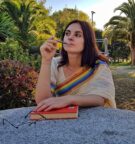Translated from the Spanish by Leyre Villate Garcia
We never knew his age. But he was older than all of us. That was evident. He was taller. Stronger. He was blond and curly, and his nose looked like a fig. Made of coral skin. He was thin and slender. But his nose was obese. Pockmarked like a potato. His voice was thick. Rough, like a bus engine. He was an adult, they said.
When he spoke, the teachers laughed. We laughed too. It was his accent. From the countryside. From the high mountains. Where they wore ruanas and the ruanas carried generations of sweat, spit, and hair. He was also stupid. It must be said. He didn’t know a fractional number from a prime number. We laughed. But the laughter didn’t last.
Outside the school, Fig Nose was waiting for you. He was escorted by Pedreros and Alarcón. Smaller than him. Also stupid. They did not know mitochondria from ribosomes. Fig Nose grabbed you by the collar of your shirt and spun you around in the air. Like a kite. He threw you to the ground. When you fell your fingertips would sting. He’d wait for you to get up and fit two punches in your face. Another pair in the chest. A kick in the legs. He’d make you eat the dirt off his shoes.
“He who laughs last laughs best,” he would say.
The general laughter was over. For us. We never laughed at him again. Not even in his absence. He who laughs last laughs best, he had said.
The same thing happened to them. To the teachers. They could laugh no more. Fig Nose was waiting for them after class. He chased them. He threatened them. He told them the same story:
“My dad was killed and my uncle Juvenal avenged him. They sent him to jail. They killed Uncle Juvenal there. My other uncle, Alcides, avenged him. They also sent him to prison. They killed him there. His son, Jairo, killed the children of the one who killed my uncle Alcides. All of them. My cousin Jairo is brave. He doesn’t mess around. And they sent him to jail too. They haven’t killed him yet. Maybe because there’s no one to take revenge on him. My mom says I should study so I don’t die like them. But she and I know that destiny is written. What I don’t know is if you are part of mine. What do you want me to tell you, sir? The future is uncertain.”
They said they would expel him but they never did. They suspended him. A couple of weeks. He came back to class and waited for us again at the end of class. He grabbed us by the collar of our shirts and did it all over again. He would break your ribs. He would macerate your cheekbones.
Those who had known him a little said that he frequented the whorehouses. That they let him in because he already had an ID card. He was an adult. One who visited the whores. He had money, they said. He was always loaded with bills. Nobody knew where it came from. The money. Nobody could imagine it.
When he asked us to help him with chores and work, so as not to flunk the year, we were able to ask him about his life. Was it true that he lived in a house near the páramo of Ocetá? That his father had been killed, and his uncle had avenged him, and that this one was also killed, and another one came to avenge him, and so on?
He laughed. He liked to laugh. That was evident. We asked him if it was true that he frequented whores. He slapped us in the face. He kicked us. Laughing non-stop. We stopped laughing when our mouths bled.
“They are sex workers,” he said. “More respect.”
Despite our efforts, Fig Nose flunked the year. He did not pass any of the subjects. Not even the easiest ones. Religion. Physical Education. Philosophy. He had no brains, they said.
In Philosophy, the teacher asked us what we wanted to do with our lives. Lawyer, one of us said. Engineer, said another. A doctor. Pilot. Nuclear physicist. Painter. Soccer player. Fig Nose said he wanted to make money. He didn’t know how. But he would make money. A lot. The teacher almost laughed. So were we. A dead silence fell over the room. The bell rang, and Fig Nose squeaked his desk and left. He wanted to make a lot of money, he had said.
The following year we saw him back. He was accompanied by two shrunken old men. Wiry. Dark-skinned peasants, wrinkled and hard as a tin can. They were asking for him to be re-admitted. Who were they? We wondered. His grandparents? What did they want? Fig Nose looked like someone else. With the same coral-skinned nose. But he was someone else. A quiet Fig Nose. Who obeyed when one of the old peasants looked at him. He would lower his head. He kept it and his nose was lost in the shadows of his body.
It turned out they were his parents. Not his grandparents. No one had killed his father. Yet. He was alive. He was a dark-skinned old man. Old, faded clothes. His grandparents, on the other hand, were dead. No one had killed them. Apparently, there were no crimes in the family of Fig Nose.
We couldn’t believe it. So many things. That they were his parents. So small. So shrunken. How could he have gotten out of that woman’s dwarf body? We wondered. She was tiny. He had to have been a baby too, someone said. Talking about someone else, we would have laughed. But not about Fig Nose. We imagined Fig Nose as a giant baby that came out of the tiny entrails of that woman. The peasant woman. Greasy hair tied with several old hooks. Small eyes and hands clasped in her lap.
They did not accept him back. They couldn’t do it. He had flunked the grade. A record. Or an anti-record, rather. Nobody had failed all subjects before. Gentlemen, your son is not made to study. They remained seated. Eyes on the principal’s glasses. Thick glasses. Green. He couldn’t take him back. Surely he must have some talent. “What do you think you’re good at?” he asked.
“I’m good at money,” he said.
We would have liked to have seen their faces. From the principal. The foggy green glasses. The peasant mother’s hands squeezing the edges of her skirt. But we didn’t see the faces. We only listened.
They left in silence. They went ahead and he, behind. They crossed the aisle of honor. Photographs of the graduating class watched them. In black and white. The diplomas and busts of the founders. Real dead. We watched them walk away towards the light. They were shadows. The three of them with their heads down. We never saw them again.
We suppose the old men are dead by now. Of old age. Because their bodies rotted or their hearts stopped. Death. The grim reaper.
Twenty years later we met again. We celebrated. We celebrated hair loss. The belly that prevents us from seeing our penis when we urinate. The double chins. The sagging breasts. The gray hair. The surgeries. The fat asses. The fathers’ and uncles’ funerals. We celebrated.
One of us recalled Fig Nose. A hush fell over the school assembly hall. Twenty years later. Still the silence. The fear. No one knew anything about him. He must have died, someone said. We burst out laughing. It was a triumph. We laughed the whole evening. We remembered the beatings of Fig Nose. His famous phrases. His myths. His lies. His parents. Some of them darkened at the memory of that pair of peasants. But for a few moments, nothing more.
Several succeeded. The pilot. The doctor. The engineer. Others, not so much. We kept trying. Fig Nose wanted to make a lot of money. We laughed again. Money. A lot of money. Nobody knew about him.
At a town festival, we saw him. A couple of years later. The nose was the same. Him. From the technical school. We told him. The woman watched us for a few obese and pockmarked like a potato. But he was no longer slender. He was fat. Big. Like a doughnut with a small Fig Nose. He wore a thin, silk shirt. The shoes were of snakeskin. They shone. A thin, slender arm, wrapped around his hand, ended in the body of a young woman. Beautiful. Like a caress on burnt skin. An angel. An angel in Givenchy shoes.
We greeted him.
“Hello, Libardo.”
We all remembered his name. He was called Libardo.
He looked us up and down. He didn’t remember us. He said. We were mistaking him. From the technical college. We told him. The woman watched us for a few moments and soon became disinterested. She went back to her cell phone.
“Libardo, it’s us.”
We were mistaking him for someone else, he said. We weren’t. Nose like that, one in a million. One of a kind. Trademark. He said a deferential goodbye and they went into a warehouse. We waited for them. They came out two hours later. A dozen bags of prestigious brands. They got into a van and got lost. Fig Nose didn’t say goodbye. He didn’t look at us. He didn’t say a word. It was him. Fig Nose. He had succeeded, someone said. Yes. He was right. He had made a lot of money. We didn’t know how.
A few months later he appeared on the front page of the newspaper. His nose. All over the front. A color photograph. The nose, this time bloody. In any case, recognizable. And next to him, the woman in Givenchy shoes. But with other shoes. Also Givenchy. Dead. Like his parents. Like the uncles of his stories. Murdered. His nose was on the front page of the newspaper. The Fig Nose. Executed by hitmen. The police had a version. The police experts. The businessman Libardo Barbosa murdered with his wife. Mistaken for a drug trafficker who had the same face and the same nose. The Fig Nose.
We never knew his age. And we never spoke of him again. Of Fig Nose. That he had made a lot of money. That he hadn’t remembered us. That he had forgotten us. Dead to him. That was obvious. We never spoke of him again. Nor of other dead.
Note: The above story is included in the book Eleven Under The Rain by Ediciones Oblicuas (Barcelona) who kindly allowed its publication in The Antonym.
Also, read a book review of the first book of the Chandal Jiban Trilogy, The Runaway Boy, by Manoranjan Byapari, published in The Antonym:
Charuibeti Or To Keep Moving Ahead With Jiban— Ahana Bhattacharjee
Follow The Antonym’s Facebook page and Instagram account for more content and exciting updates.



























0 Comments